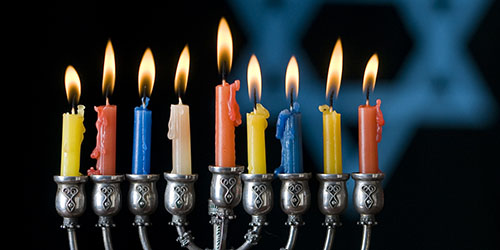— from David Kobrin —

The Jewish holiday of Hanukkah – The Festival of Lights – begins this year on Christmas Eve.
And this year, 2016, it seems to me, it’s worth a look at the history of the holiday itself.
The events that Hanukkah celebrates happened more than 2000 years in the past. Hanukkah began as a celebration of the victory of a small band of Jewish soldiers over those who had conquered the Jewish nation. Some Jews at the time were pleased to adopt the Greek ways of their overlords. But for others, the only option was the defeat of those who sought to impose Greek/Hellenistic culture on the Jews.
Over the centuries, the importance of Hanukkah in the Jewish calendar declined. Hanukkah is one of only a few Jewish holidays whose celebration is neither mentioned nor commanded in the Torah (The Old Testament). In addition, the rabbis who directed the course of Judaism in the Diaspora did not favor a holiday which emphasized the importance of rebellion over study and ritual observance.
The de-emphasis on Hanukkah continued until a new wave of Eastern European Jews emigrated to the United States in the 1880’s and 1890’s. Like immigrants before them, these Jews wanted to learn what it means to be an American – but without giving up the religious culture of the old country. There were numerous conflicts between the new and the old ways. For example, religiously observant Jews were commanded not to work on the Sabbath; yet their jobs – their bosses – often required work on Saturday.
Then, in the 1920s, some Jews thought they could use Hanukkah to help ease the problem of assimilation and acceptance. Hanukkah occurs in the same season as Christmas, they reasoned. What if Hanukkah, like Christmas, also became a time for exchanging presents? Then Jewish Americans, like their neighbors, would have an important celebration in the same season. In the 1920’s American businesses saw an opportunity. Colgate, for instance, advertised their beauty products as suitable for Hanukkah gifts; Loft’s and Barton’s chocolates produced chocolate Hanukkah “gelt”; and Aunt Jemima advertised its flour as perfect for traditional Jewish holiday favorites.
In 1948 the creation of Israel as an independent state placed a more favorable emphasis for Jews on the rebellion story of Hanukkah. The successful use of a Jewish military force in the Middle East made Hanukkah much more acceptable – even exciting – to American Jews in the 1950s and ‘60s. Hanukkah now came into its own – at least in the United States – as an important holiday that helped many Jews feel like proud Americans.
This year Hanukkah also feels more important to me, an American who is also a Jew. Or, a Jew who is also an American.
What I’d like to celebrate this Hanukkah is the long history of the separation of “church” and “state” in our country. The First Amendment to the U.S Constitution guarantees to every individual the right (the privilege) to believe in and to practice the religion of their choice. The government, the Constitution states clearly, is not to favor any one religion over another. Nor is it to act to suppress an American’s right to practice the religion of their choice, even if that religion seems different, or foreign, or strange, or “dangerous.” (Individual acts of violence, of course, can never be excused under the First Amendment. The individuals involved must be held responsible.)
This year, Hanukkah, for me, raises the question of what it means to be a minority group in our country. During Hanukkah 2016, I want my focus to be three-fold: the original story of Jewish rebellion and victory more than 2000 years ago; the story of how Hanukkah rose from a minor holiday to one that is widely celebrated by Jews in the United States, and recognized by many non-Jews as important to Jews, and, what lessons these stories can teach us about our situation today in 2016.
**If you are reading theOrcasonian for free, thank your fellow islanders. If you would like to support theOrcasonian CLICK HERE to set your modestly-priced, voluntary subscription. Otherwise, no worries; we’re happy to share with you.**








Thanks, David, for this interesting history lesson. May we all nurture kindness toward one another in this time of uncertainty, whatever we celebrate.
Thank you for this so thoughtful and relevant piece. Happy Hanukkah.
Thank you so much for the wonderful history lesson! Learning about one another is so important! You told me things I never knew! Merry
Thanks David. Happy Hanukkah.